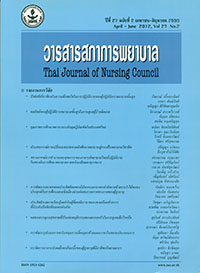ผลของการดูแลสุขภาพที่บ้านต่อพฤติกรรมของครอบครัว ในการดูแลเด็กโรคหืด
Keywords:
การดูแลสุขภาพที่บ้าน, พฤติกรรมการดูแลของครอบครัว, เด็กโรคหืด, home-based healthcare, families’ care for asthmatic childrenAbstract
บทคัดย่อ
การวิจัยครั้งนี้เป็นการวิจัยกึ่งทดลอง มีวัตถุประสงค์เพื่อศึกษาผลของการดูแล สุขภาพที่บ้านต่อพฤติกรรมของครอบครัวในการดูแลเด็กโรคหืด โดยทำการศึกษาครอบครัว เด็กโรคหืด จำนวน 40 คนที่มารับบริการแผนกผู้ป่วยนอกโรงพยาบาลป่าโมก จังหวัด อ่างทอง ทำการสุ่มกลุ่มตัวอย่างเข้ากลุ่มทดลองและกลุ่มควบคุมกลุ่มละ 20 คนในกลุ่ม ควบคุมได้รับการดูแลตามปกติ ส่วนกลุ่มทดลองได้รับโปรแกรมการดูแลสุขภาพที่บ้าน โดยการติดตามเยี่ยมบ้านด้วยกระบวนการเสริมสร้างพลังอำนาจ จำนวน 3 ครั้ง ใช้เวลา ทั้งหมด 4 สัปดาห์ประกอบด้วย 4 ขั้นตอนคือ 1) การสร้างสัมพันธภาพและค้นหาสถานการณ์ จริงของเด็กโรคหืดและครอบครัว 2) การสะท้อนคิดอย่างมีวิจารณญาณ เพื่อหาแนวทาง แก้ปัญหาที่เหมาะสม 3) การตัดสินใจเลือกวิธีปฏิบัติด้วยตนเอง หลังการส่งเสริมความรู้ ทักษะในการดูแลเด็กโรคหืด 4) การคงไว้ซึ่งพฤติกรรมการดูแลเด็กที่มีประสิทธิภาพ การเก็บรวบรวมข้อมูลก่อนและหลังเข้าร่วมโปรแกรม 12 สัปดาห์ โดยใช้แบบสอบถาม พฤติกรรมของครอบครัวในการดูแลเด็กโรคหืด สถิติที่ใช้ในการวิเคราะห์ข้อมูล ได้แก่ ความถี่ ร้อยละ ค่าเฉลี่ย ส่วนเบี่ยงเบนมาตรฐาน และ สถิติ Independent t-test
ผลการวิจัยพบว่า ค่าเฉลี่ยผลต่างพฤติกรรมของครอบครัวในการดูแลเด็กโรคหืดใน กลุ่มทดลองสูงกว่ากลุ่มควบคุมอย่างมีนัยสำคัญทางสถิติ (p <.001) และค่าเฉลี่ยผลต่าง จำนวนครั้งการเกิดอาการหอบหืดกำเริบของเด็กโรคหืดมีความแตกต่างกันอย่างมีนัยสำคัญ ทางสถิติ (p < .001)
ผลการศึกษานี้สามารถนำไปใช้ในการส่งเสริมพฤติกรรมของครอบครัวในการดูแล ผู้ป่วยเด็กโรคหืด และควรมีการติดตามผลในระยะยาว เพื่อดูการคงอยู่ของพฤติกรรมการดูแล
คำสำคัญ : การดูแลสุขภาพที่บ้าน, พฤติกรรมการดูแลของครอบครัว, เด็กโรคหืด
Abstract
The main objective of this experimental research was to study impacts of home-based healthcare on families’ care for asthmatic children. The study was conducted in the families of 40 asthmatic children receiving OPD treatment at Pa Mok Hospital, Ang Thong Province. The subjects were equally sampled into an experimental group and a controlled group. Whilst the controlled group received normal treatment, the experimental group was given a home-based healthcare programme. This programme, which consisted of three home visits by healthcare personnel for an encouragement purpose, lasted four weeks and involved four phases: (i) building a good rapport with and identifying situations of asthmatic children and their families; (ii) critically reflecting on the problem to determine proper solutions; (iii) deciding independently after receiving proper knowledge and skills in caring for asthmatic children; and (iv) maintaining the efficient care-giving programme. The data were collected both before and after the children’s participation in the 12-week programme, through a Family’s Care for Asthmatic Children Questionnaire. The statistic analysis of the data was based on frequency, percentage, mean, standard deviation and independent T-test.
The research showed that the average score of the experimental group’s home-based care for asthmatic children was significantly higher than that of the controlled group (p < .001). Besides, the average number of asthmatic attacks occurring in the two groups differed significantly at p < .001.
The results of this study could be applied to the promotion of home-based care for asthmatic children. In addition, long-term follow-up programmes are recommended to ensure on-going care-giving practice.
Keywords : home-based healthcare, families’ care for asthmatic children







